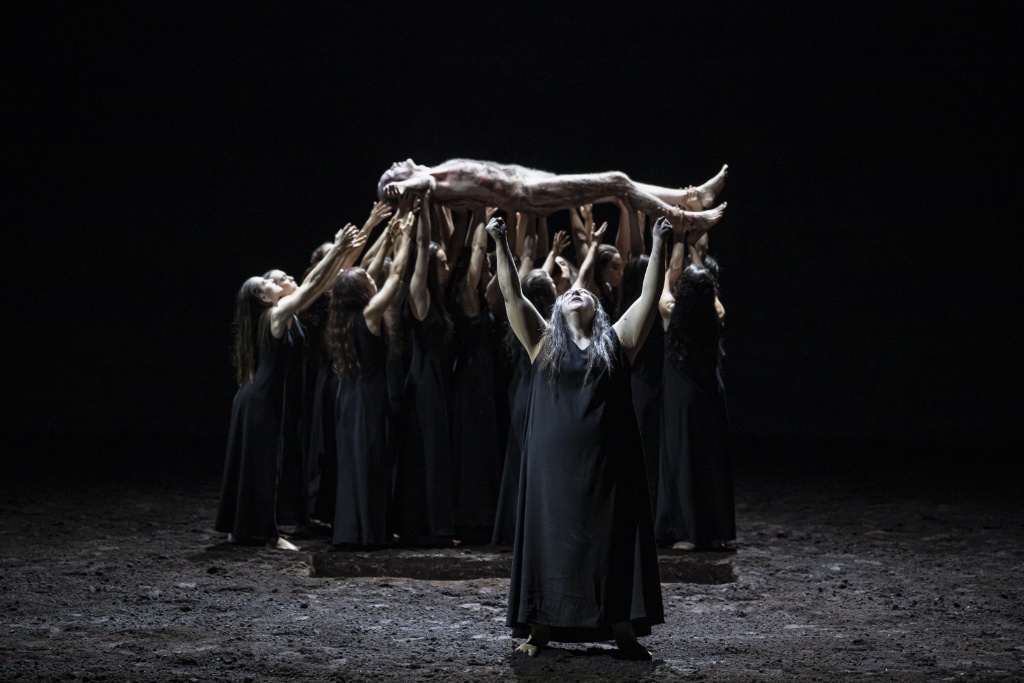
Richard Strauss’s one-act opera Elektra, the first of his many collaborations with librettist Hugo von Hofmannsthal, is unrelentingly hard-hitting throughout its one hour and 45 minutes. No room or time is given for light relief as the heroine singlemindedly pursues her mission of avenging her father Agamemnon’s murder by her mother Klytämnestra and Aegisth, her mother’s lover. Canadian director Robert Carsen pulls out all the stops in this reprise of his 2013 production at the Bastille Opera House, and if some of his theatrical ideas work better than others, the audience is treated to an evening of visceral music-making with a starry cast and the Orchestre de l’Opéra National de Paris on scintillating form, conducted with energy and intelligence by Semyon Bychkov.
The dark, empty stage in this production is dominated by a grave-shaped hole at its center: Carsen clearly wishes to emphasize the psychological state of the mythical figures, with Elektra surrounded throughout by a large group of women, who perform the role of a silent chorus as they engage in a beguiling modernist ballet. This chorus-in-movement’s most dramatic and disturbing deed comes in Elektra’s opening invocation of her dead father, when his naked corpse is exhumed from the hole and held aloft, evoking the image of the crucified Christ.
The fact that, with the exception of Klytämnestra, all the female characters and chorus members are dressed in identical sleeveless black robes gives a strong sense of the oppressively dark situation that the women share in this mythical tale, but it also has the unfortunate effect of making it difficult to differentiate between them. The opera opens, for example, with four of the five female servants (all dressed in the same attire) showing little sympathy for the outcast Elektra’s plight, but when they are joined by the identically clothed full chorus, who show their support for the title character throughout, it is difficult to understand how the servants have been able to shift their viewpoints so suddenly.
The confusion worsens when the feral Elektra and her loving but much more conventional sister Chrysothemis appear together. One of the most touching aspects of the opera lies in the fact that the two sisters are so different from each other, but this important distinction is lost when they merge visually with the chorus.
Paradoxically, the only two characters not to appear in dark-hued clothes in this production are Agamemnon’s murderers, Klytämnestra and Aegisth, who are dressed in white. The blonde Klytämnestra, who normally is portrayed as a grotesque, vampish queen dripping in jewels, looks like a former matinée idol. Angela Denoke sings the part with subtlety, almost sympathetically, but if ever there was a role that demands an over-the-top performance, this is it. The horror we should surely feel at her laughter when she receives the (false) news that her son Orest is dead is completely lost here.
The American soprano, Christine Goerke, attacks the title role with gusto. If her high notes at times were slightly off-key, the strength of the lower and middle registers of her voice was particularly impressive, and she showed the lyrical side of her role, too. The moment of tenderness that she shares with her brother Orest, sung with noble grace by Tómas Tómasson, when she finally recognizes him, is particularly memorable. Elza van der Heever, who was due to sing the role of Chrysothemis, was indisposed for the first two performances and was replaced by different singers on each night. On the night I attended, Lithuanian soprano Vida Miknevičiūtė, who performed the part at the 2021 Salzburg Festival, came close to stealing the show, singing with extraordinary strength and beauty. All the other solo singers were excellent, especially Gerhard Siegel as the lascivious Aegisth and Lucian Krasznec in the brief but beautifully sung high tenor role of the young servant.
Elektra is not an opera for the faint-hearted, but, for all the production’s dark gloominess, it is well worth seeing and hearing for Carsen’s powerfully graphic staging, the strength of Bychkov’s musical direction, the excellent orchestral playing and the committed vocal performances.
Nick Hammond’s latest book, The Powers of Sound and Song in Early Modern Paris, is available in paperback and as an e-book here and from online vendors.
Favorite